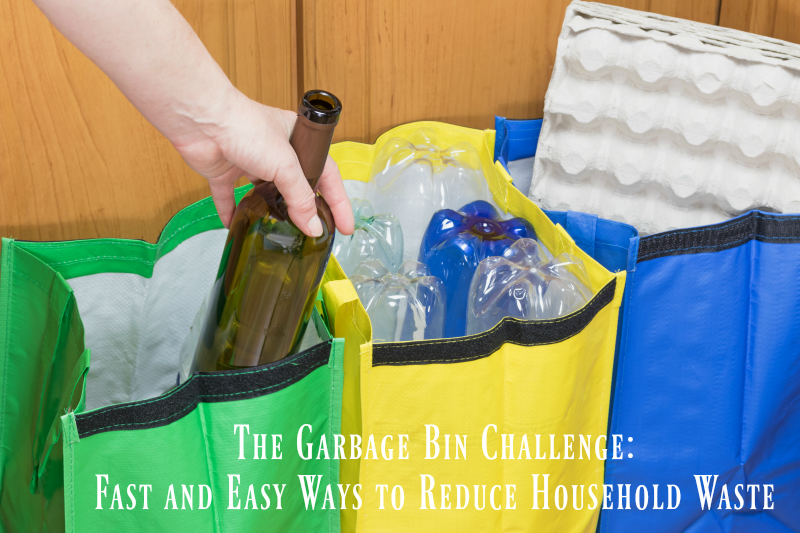Excessive waste is a problem for many countries around the world. While solutions are brought to attention, few are put into action. Nothing can rid the world of waste yet the best solution may start with the individual. Some are making great efforts to reduce the amount of waste they produce. Are you prepared to take the garbage bin challenge and reduce your household waste?
Think Smaller
For some, reduction starts with simplification. Perform an audit of your values and lifestyle. What motivates you? What do you value? What do you really need and which things are short term wants? As you begin to think smaller, you’ll find it easier to live with less and desire a fewer possessions. Prefer to invest in things that are reusable, fixable, and serve more than one function.
Stop Single Usage
Small changes can have huge impacts. Imagine if 10% of all Starbucks customers used reusable cups rather than got a new cup with each purchase? Similarly, imagine if a significant percentage of those who went to the grocery store brought their own bags? It would allow for a lot less waste. Stop single usage where and when you can.
Eat Whole Foods
How much food and package waste is produced by your household? Imagine living more like a farmer, getting fresh food daily and leaving little to no waste. You don’t have to live on a farm to incorporate more whole foods into your diet. Moreover, learning quick and easy recipes reduces the amount of utilities needed. Buying less packaged and processed foods is better for your body and the environment.
Buy Less But Better
As you think smaller, consider investing in better made products. For example, you may divorce yourself from fashion yet you’ll need to identify quality clothes. Buying higher quality clothing is not a salute to materialism but simplicity; buying better means that you can get away with purchasing less. Buying cheaper commodities increases the likelihood that you’ll need a replacement or will soon opt for an upgrade.
Supersize It
Some prefer to shop at savings clubs because it affords them savings. However, an added benefit of going to a wholesaler is the opportunity to buy larger sized containers, which is better than buying smaller packages more frequently. Identify the goods you repeatedly need and then supersize your purchases. Such buys may include laundry detergent, toilet paper, body soap, etc.
Use Rags and Handkerchiefs
How many tissues and paper towels are used throughout the household? Maybe you never thought about it, but you probably use more than you think. Can you use a handkerchief each time you need a tissue? Can you use old rags or t-shirts to clean the home, washing these items and then reusing? Consider how much waste you’ll reduce in one year’s time. It’s a minor change but it makes a big impact.
Compost Food and Yard Waste
Depending on your family’s habits and the landscape of your property, a large portion of your waste may derive from food and the yard. Food scraps along with yard debris and trimmings can be tossed in an outdoor compost bin. Composting is a good ideas for those with children who may make compositing a lifelong habit. For larger demolition and waste removal jobs, contact Dirt Cheap Rubbish Removal.
Stop Receiving Unwanted Mail
Tons of junk mail are discarded each day around the globe. Reserve a moment and discontinue receiving the Yellow Pages and junk mail. Like unsolicited phone calls, receiving junk mail becomes a nuisance. However, few know how easy it is to stop receiving unwanted mail. Go online, register, and reduce the waste.
Reuse Water Bottles
Ironically, the healthy act of drinking water bottles is pretty wasteful. Stop buying water bottles and start filling a reusable vessel with tap or filtered water. Generations have survived without consuming bottled water. Perhaps it’s become a preference but realize it’s not a necessity. Placing a filter on your faucet or buying a handheld model is easy and inexpensive.
Put a Price on the Grocery List
How many times do you go to the grocery store and purchase things you don’t use or need? Put a price limit on your shopping list so you’ll buy only the essentials. Also, the process will curb snacking and overeating. Alternatively, visit the grocery store each evening, buying only what’s needed for the next twenty four hours. This makes it easier to eat fresh, whole foods.
Matty has over a decade of experience in Sydney’s rubbish removal industry. He has built his business up from scratch and aims to make it as easy as possible for people to clean up and get rid of bulky unwanted waste, with on-site hand loaded waste removal.
